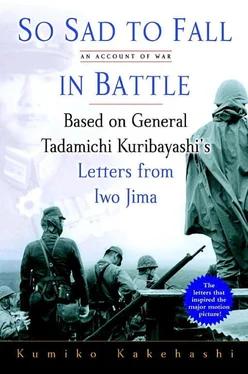The United States may also have been “the most difficult country” for Kuribayashi to fight. After all, in the course of his two-year sojourn there while in his thirties, Kuribayashi had not just experienced the industrial and military power of the place, but the everyday life of the people—and they were just like the Japanese.
When I first visited Tarô Kuribayashi’s house in Akishima in the fall of 2003, I was shown one folder of letters that did not come from Iwo Jima. Reading them, I was surprised at how different they were from the letters he had sent from the front.
Each letter was a brief passage of text coupled with humorous and deftly drawn illustrations on unlined white paper. There were forty-two letters in total. Kuribayashi had written them to his family while he was studying in the United States.
I felt I had stumbled upon an unlikely talent for Kuribayashi to have. The drawings were all surprisingly good: there was nothing amateurish about their freedom and confidence of line.
Tarô, Kuribayashi’s son, was three at the time and not yet able to read. It was for him that Kuribayashi described, on August 27, 1928, from Buffalo, New York, his life in America in pictures.
This is an American child
At play
Here tricycles are all the rage
And when your daddy sees
Children playing that way
I always stand rooted to the spot a while
And look at them
Thinking: I wonder if little Tarô
Is having fun playing like this, too?
The letter includes a pen drawing of a group of three children playing on tricycles.
Off in a foreign land, Kuribayashi must have often thought about his young son, as little children make frequent appearances in his illustrated letters, whether he’s giving a child a lift back from school in a car, or admiring the dancing of the daughter of an army captain friend. Kuribayashi would even invite the newspaper delivery boy in for a meal, or talk to a couple of poor brothers out on the street at night.
Daddy has invited in the delivery boy
And given him a slap-up meal
He has a stepmother now, not a mother
His real mother
Died when he was just a baby
So he never knew her
“My daddy is a sergeant-major
He works in a place called ‘the accounts room’
Do you know him, Mister?
When I get bigger, I’ll go to Japan, sure I will
So your son’s called Tarô, Mister?
Reckon that’s an interesting name…”
“Ah, I see
Are you tired out from delivering the papers every night?
It’s all right. Today I bought candy and walnuts
All sorts of nice things for you
So go on then, eat up
What? Me, teach you Japanese?
It’s difficult, you know.”
At about nine at night
Daddy gets out of his car and walks a little
In a murky spot, standing dejectedly,
Were two children
One of them was of the same age as Tarô
Without thinking I stopped in my tracks
“What are you doing out so late?
Are you brothers?
Where are your shoes? What? You haven’t got any?
Poor you. I’ll give you both a little bit of money….”
“This is my little brother
Yes, we are Mexicans
Our father drinks too much and life’s difficult
Me, I’m six
Our father doesn’t give us any money at all
Thank you. Thank you. Thank you.”
The illustrated letters were neatly bound like a book. By the time I looked at them, more than seventy-five years had passed since they were written, but they were neither stained nor damaged, and the two illustrations that had been colored in had not faded at all. It was obvious that the family had preserved them with the greatest care.
Tarô was reluctant to talk much about the letters from Iwo Jima—the scene of his father’s death—but his expression softened when he looked at the illustrated letters. In them his father is a young man, overflowing with curiosity, hope, and ambition, while Japan has yet to plunge into a doomed war. In light of what the family was later to experience, this was a happy time for them, even though duty had taken the head of the family abroad.
“It looks like my father was a big hit in America. Here, have a look at this one.”
Tarô was pointing at a letter in which a group of people were waving good-bye to Kuribayashi as he went off in a taxi. When he started his studies in America, he lodged with an ordinary, nonmilitary family in Buffalo, New York. The picture shows him leaving Buffalo to go to Washington, D.C., from where, on November 19, 1928, he had written:
My landlady in Buffalo
And all the ladies of the neighborhood
Are sorry
That Daddy is leaving
That’s how much Daddy
Was loved by them all.
Kuribayashi had sailed for America in March 1928. He was a thirty-six-year-old cavalry captain five years out of the Army War College.
Overseas study was a special privilege of the guntô-gumi , the “saber squad,” officers who had graduated with honors from the Army War College and were so named because they were personally presented with a saber by the emperor. Members of the saber squad would go to countries like Germany, Russia, Great Britain, the United States, and China to study, with Germany being the most popular destination.
Kuribayashi was in the twenty-sixth graduating class of the Military Academy. An examination of the overseas destinations selected by the twenty-eight graduates from the twenty-fifth, twenty-sixth, and twenty-seventh classes shows that Germany, chosen by ten people, was top, with France, chosen by seven, in second place. The unpopularity of English-speaking countries is striking, with only four graduates choosing the United States, and one choosing Great Britain.
There were few people in the Japanese army who knew much about Great Britain or the United States, and the resulting tendency to underestimate their military and industrial might was to prove one of the causes behind Japan’s defeat in the Pacific War. This deficiency was directly related to the army’s system for educating its high-level officers.
The typical course followed by elite army officers involved Military Preparatory School, followed by the Military Academy, and culminating in graduation from the Army War College. It was also possible to attend an ordinary middle school (under the old system) rather than the Military Preparatory School, and go on to the Military Academy. Graduates of the Military Preparatory School, however, fared far better when it came to promotion. The idea was deeply entrenched that the graduates of the Military Preparatory School were privileged, while anyone who had graduated from an ordinary middle school was merely acceptable. As a result, most of the pivotal posts in the army were held by officers who had attended the Military Preparatory School.
The foreign language curriculum at the Military Preparatory School included German, French, and Russian, with English not offered until 1938. Since the Japanese army was modeled on the German army, the majority of students chose to learn German. This also accounted for the large numbers of army men who chose to do their overseas study in Germany.
In ordinary middle schools, however, English was compulsory. Many of the young officers who had progressed to the Military Academy from such schools chose to spend their period of overseas study in English-speaking countries like the United States and Great Britain. But since the products of ordinary middle schools were not viewed very highly, officers with a strong knowledge of the United States and Great Britain seldom attained the most important posts.
Kuribayashi was not a product of the Military Preparatory School, having progressed to the Military Academy via a middle school in Nagano. One of Kuribayashi’s men from the days when he had commanded the First Cavalry Brigade in Baotou, China, told me that he believed “Kuribayashi having not gone to the Military Preparatory School was a major factor in his having such a breadth of vision.”
Читать дальше












